新概念英语一册第67-68课件分解
合集下载
新概念一L67-68ppt

from school today. 5.Thursday is between W_e_d_n_e_s_d_a_yand Friday.
7
8
二、Text
9
请欣赏音图动漫!(twice)
1. How’s Jimmy today? Key: He’s very well.
2. What are the Johnsons going to do
too
Were you at the butcher’s,
?
MRS. JOHNSON: NHoo,w’I swasn’t. I was at the
greengrocer’s.
Jimmy today? well
MRS. WILLIAMS: He’s veraybsent from , thank you.
Sam: No, 1__I___w_a_s_n_’___t
Nick: Where were you? Sam: I was in the office. Nick: Were you absent last week?
Sam: Yes, 2___I__w_a_s____ Nick: How 3__w_e_r_e__y__o_u_?
Thu,rsday
Wednesday and
.
How are you all keeping?
MRS. JOHNSON: Very well, thadnakysyou. country We are going to spend thrmeoether’s in weekend
the
F.riday
We arceougnotirnyg to stay at my
the
.
7
8
二、Text
9
请欣赏音图动漫!(twice)
1. How’s Jimmy today? Key: He’s very well.
2. What are the Johnsons going to do
too
Were you at the butcher’s,
?
MRS. JOHNSON: NHoo,w’I swasn’t. I was at the
greengrocer’s.
Jimmy today? well
MRS. WILLIAMS: He’s veraybsent from , thank you.
Sam: No, 1__I___w_a_s_n_’___t
Nick: Where were you? Sam: I was in the office. Nick: Were you absent last week?
Sam: Yes, 2___I__w_a_s____ Nick: How 3__w_e_r_e__y__o_u_?
Thu,rsday
Wednesday and
.
How are you all keeping?
MRS. JOHNSON: Very well, thadnakysyou. country We are going to spend thrmeoether’s in weekend
the
F.riday
We arceougnotirnyg to stay at my
the
.
新概念英语NCE1_lesson67-68(共17页)课件

❖ 介词at可表示地点,通常用于某个小地点之前: ❖ at the bus-stop 在公共汽车站 ❖ at the railway station在火车站 ❖ at school 在学校 ❖ at home在家
❖ (2)介词on用于周和月份中的任何一天 之前。
❖ 通常使用介词 on表示星期几(如 on Monday在星期一)、一天中的某段时间 (如 on Monday morning在星期一早上)、 日期(如 on April 1st在4月1日)、星期几 +日期(如 on Monday,April 1st在4月1日, 星期一)、具体时间(如 on that day在那 一天)、周年纪念日(如 on your birthday 在你的生日)以及节日(如 on Christmas Day在圣诞节)等。
Lesson 68 what’s the time ?
New Words
church 教堂 dairy 乳品店 baker 面包师傅 grocer 食品杂货店
Key structures
-Where were you on Monday? -I was in GZ.
-When were you at the office? -9:00 pm last night.
was is
(He, She, It)
第二人称单数,复数 are were
(You)
Exercise
❖ 他们昨天在北京。 ❖ 他去年还是个学生。 ❖ 你昨晚在家吗? ❖ 你们上午在哪儿?
用介词at, on和in的时间短语
❖ (1)用介词 at的时间短语通常可表示:确切的时间(如 at 10 o' clock 10点钟时),用餐时间(如 at lunchtime午餐 时),其他时刻(如 at noon中午时),年龄(如 at the age of 27 27岁时)等。
❖ (2)介词on用于周和月份中的任何一天 之前。
❖ 通常使用介词 on表示星期几(如 on Monday在星期一)、一天中的某段时间 (如 on Monday morning在星期一早上)、 日期(如 on April 1st在4月1日)、星期几 +日期(如 on Monday,April 1st在4月1日, 星期一)、具体时间(如 on that day在那 一天)、周年纪念日(如 on your birthday 在你的生日)以及节日(如 on Christmas Day在圣诞节)等。
Lesson 68 what’s the time ?
New Words
church 教堂 dairy 乳品店 baker 面包师傅 grocer 食品杂货店
Key structures
-Where were you on Monday? -I was in GZ.
-When were you at the office? -9:00 pm last night.
was is
(He, She, It)
第二人称单数,复数 are were
(You)
Exercise
❖ 他们昨天在北京。 ❖ 他去年还是个学生。 ❖ 你昨晚在家吗? ❖ 你们上午在哪儿?
用介词at, on和in的时间短语
❖ (1)用介词 at的时间短语通常可表示:确切的时间(如 at 10 o' clock 10点钟时),用餐时间(如 at lunchtime午餐 时),其他时刻(如 at noon中午时),年龄(如 at the age of 27 27岁时)等。
新概念一L67-68ppt课件
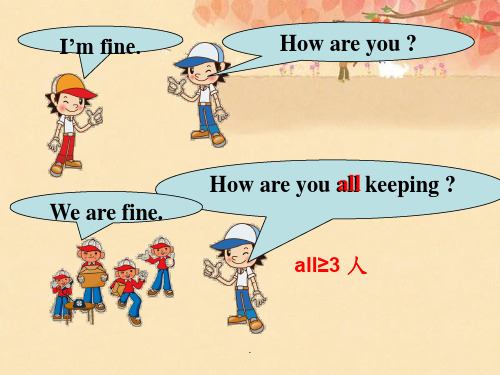
week?
.
MRS. WILLIAMS: Yes, he was. He was absent on Monday, Tuesday, Wednesday and Thursday. How are you all keeping ?
MRS. JOHNSON: Very well, thank you. We are going to spend three days in the country. We are going to stay at my mother’s for the weekend. MRS. WILLIAMS: Friday, Saturday and Sunday in the country! Aren’t you lucky!
at the grocer’s .
随堂补充资料
1. Monday is after S_u_n_d_a_y____. 2. The ba_k_e_r____ can make nice bread. 3. I’m going to s_pe_n_d____ two days in French. 4. Jill has a temperature. She is a_b_s_e_n_t_ from
.
名词篇
MRS. JOHNSON: Hello. Were you at the butcher’s? MRS. WILLIAMS: Yes, I was.
Were you at the butcher’s, too? MRS. JOHNSON: No, I wasn’t. I was at the
.
综合篇
MRS. JOHNSON: Hello.Were you at thebutcher’s? MRS. WILLIAMS: Yes, I was.
.
MRS. WILLIAMS: Yes, he was. He was absent on Monday, Tuesday, Wednesday and Thursday. How are you all keeping ?
MRS. JOHNSON: Very well, thank you. We are going to spend three days in the country. We are going to stay at my mother’s for the weekend. MRS. WILLIAMS: Friday, Saturday and Sunday in the country! Aren’t you lucky!
at the grocer’s .
随堂补充资料
1. Monday is after S_u_n_d_a_y____. 2. The ba_k_e_r____ can make nice bread. 3. I’m going to s_pe_n_d____ two days in French. 4. Jill has a temperature. She is a_b_s_e_n_t_ from
.
名词篇
MRS. JOHNSON: Hello. Were you at the butcher’s? MRS. WILLIAMS: Yes, I was.
Were you at the butcher’s, too? MRS. JOHNSON: No, I wasn’t. I was at the
.
综合篇
MRS. JOHNSON: Hello.Were you at thebutcher’s? MRS. WILLIAMS: Yes, I was.
新概念英语第一册第67-68课课件
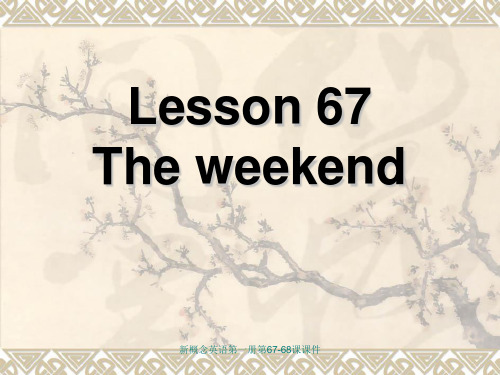
e.g. 1、Mrs. Peter always carried an umbrella. 彼得太太过去老是带着一把伞
2、I was late yesterday. 昨天我迟到了。
3、When she was a teacher, she was very strict. 当她以前是一名老师时,她很严厉。
♣ MRS.JOHNSON:
Very well, thank you. ✲ very well: 身体好。
✲ 主语 + be动词 + going to + 动原:某人/物将要做某事。 We're going to spend three days ✲ spend:花费
✲ country: 当乡村时,前面要加定冠词the;
肯定回答:Yes,主语 was新/w概e念r英e语. 第否一定册第回67答-68:课课N件o, 主语 wasn’t/weren’t.
He was a boy many years ago. He is a singer now.
新概念英语第一册第67-68课课件
❖ She was a girl many years ago.
Lesson 67 The weekend
新概念英语第一册第67-68课课件
Discussion
What did you do on weekend ?
新概念英语第一册第67-68课课件
New Words
greengrocer 蔬菜水果零售商
absent
缺席的
keep
处于、保持
spend
度过
weekend 周末
✲ well是形容词,表示身体好;
★ MRS.WILLIAMS: He's very well, She is well.
新概念册67-68课ppt
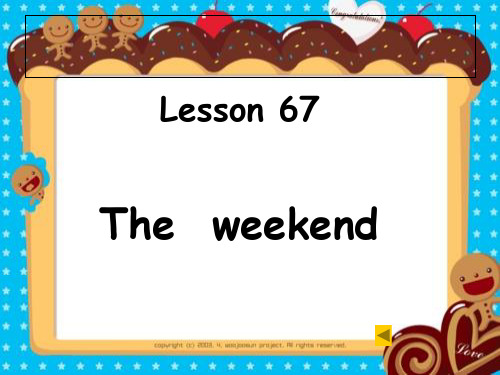
Lesson 67
The weekend
The weekend
go shopping shopping list
• greengrocer • abscent • Monday • Tuesday • Wendsday • Thursday • keep
• spend • weekend • Friday • Saturday • Sunday • country • lucky
旷工
eg. She doesn’t like school, so she is often absent from school.
她不喜欢上学,所以她经常缺课。
★keep v.
(身体健康)处于(状况);保存, 保留保守;储藏
翻译: eg. Keep the fire __b_u_r_n_i_n_g__(burn). 让火一直
我花了3个小时来做一个纸船。
★ pay [人做主语,人为某物付钱] pay (sb) for sth eg. I paid him for the broken
vase. 我付给他打碎的花瓶钱.
★country n. 乡村
① n. 国家;国土;故乡
② n. 乡下,乡村 country表示“农村”时,前面一 定要加定冠词the。
were的否定weren’t
was 的否定 wasn’t
• How is Jimmy today? • How are you? How is she/he? • How are they?
•
How are you all keeping?问人怎么
样? 也可以说How are you doing?
engrocer greengrocer’s
The weekend
The weekend
go shopping shopping list
• greengrocer • abscent • Monday • Tuesday • Wendsday • Thursday • keep
• spend • weekend • Friday • Saturday • Sunday • country • lucky
旷工
eg. She doesn’t like school, so she is often absent from school.
她不喜欢上学,所以她经常缺课。
★keep v.
(身体健康)处于(状况);保存, 保留保守;储藏
翻译: eg. Keep the fire __b_u_r_n_i_n_g__(burn). 让火一直
我花了3个小时来做一个纸船。
★ pay [人做主语,人为某物付钱] pay (sb) for sth eg. I paid him for the broken
vase. 我付给他打碎的花瓶钱.
★country n. 乡村
① n. 国家;国土;故乡
② n. 乡下,乡村 country表示“农村”时,前面一 定要加定冠词the。
were的否定weren’t
was 的否定 wasn’t
• How is Jimmy today? • How are you? How is she/he? • How are they?
•
How are you all keeping?问人怎么
样? 也可以说How are you doing?
engrocer greengrocer’s
新概念英语NCE1_lesson67-68(共33页)课件

were的否定weren’t
was 的否定 wasn’t
• How is Jimmy today? • How are you? How is she/he? • How are they?
•
How are you all keeping?问人怎么
样? 也可以说How are you doing?
名词性…的 反身代词
mine
myself
his
himself
hers
herself
its
itself
ours
ourselves
theirs
theirselves
yours
yourselves
New words
• Monday 星期一 • Tuesday 星期二 • Wednesday 星期三 • Thursady 星期四 • Friday 星期五 • Saturday 星期六 • Sunday 星期日
• He was absent in Monday,Tuesday,
Wednesday ,and thurday. from
• We are going to spent three days on the
country. spend
in
• Aren’t you luck!
lucky
Monday Tuesday Wednesday Thursday Friday Saturday Sunday
• How is everything/it going?
•
What’s going on?
那一般我们都怎么回答呢?
• Not bad. • Pretty well. Very well. • Great. • I’m OK.
新概念英语第一册第67-68课课件
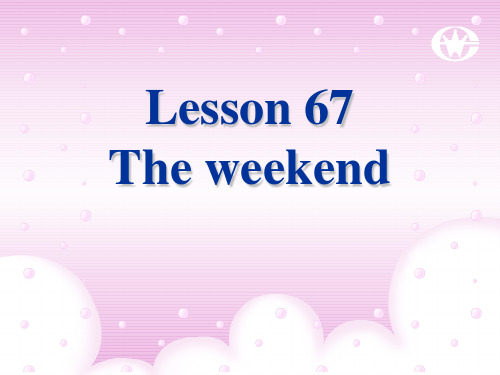
be动词的过去式
主语/时态 第一人称单数 ( I) 第三人称单数 (He, She, It) 第二人称单,复数 (You)第一人称、第三人 称复数we/they 现在时 am was is are were 过去时
is------isn’t
am-------am
not are-------aren’t
= How are you ? 用介词on。 keep v. (身体健康)处于(状况)
♣ MRS.JOHNSON:Very well, thank you. We're going to spend
three daysin the country. We're going to stay at my mother's for the weekend. stay: 短暂的居住。 for the weekend: 整个周末这几天 的时间。 at the weekend 强调时间的某一点
✲ well是形容词,表示身体好
♣ MRS.JOHNSON: Was he absent from school last week? last:上一个 week:周 last week:上周
★ MRS.WILLIAMS: Yes, he was. He was absent on Monday, Tuesday, Wednesday and Tuesday. on:表示在星期几 How are you all keeping?
find out: 有了什么,什么有变化 yesterday am----->was is------->was are------>were
一般过去时
定义:表示过去某个时间发生的动作或者存在
新概念一L67-68The weekend课件

I walked to school yesterday. He walked to school yesterday.
单数was,复数were
过去式 无人称、数的变化
句型转换
肯定句变否定句:
肯定句变一般疑问句:
I was in the office last night.
I was in the office last night.
ten to ten
o’clock
to 超过30分
half past
past 不超过30分
what’s the time?
five past seven
fifteen to nine a quarter to nine
five to ten
what’s the time?
P135 写出图上的时间
I was not in the office last night.
Were you in the office last night?
They were in the office just now.
They were in the office just now.
They were not in the office just now. Were they in the office just now?
['mʌndɪ] ['tju:zdɪ]
['wenzdɪ] ['θɜ:zdɪ] ['fraɪdɪ] ['sætədɪ] ['sʌndɪ] ['wi:kend]
n.星期一 n.星期二 n.星期三 n.星期四 n.星期五 n.星期六 n.星期日 n.周末
新概念英语第一册第67-68课课件 Liya

thank you.
✲ 也可作副词,修饰动词。 He swims well.
♣ MRS.JOHNSON: Was he ✲ be (动词) absent from:缺席
absent from school last week?
✲ last:上一个 week:周
✲ last week:上周
(1)You were absent/Were + 主语 + …?
e.g. ① I was late yesterday.
昨天我迟到了。
Were you late yesterday? 你昨天迟到了吗?
②You were happy when you were at school. 当你在学 校,你很开心。
Were you happy when you were at school? 你在学校开心吗?
We're going to spend three days ✲ spend:花费
✲ country:
当乡村时,前面要加定冠词the;
in the country.
(1)spend time/money (in) doing something
作为国家时,前面不能加定冠词。 花费时间、金钱做某事
We're
His father and mother weren’t teachers. 他爸爸妈妈以前不是老师
was ill 2 days ago. 张小姐前两天病了。
Mi⑥ssMiZhsasngZhwaasnng’t ill 2 days ago. 张小姐前两天没有
一般过去时的句型构成形式:
一、含有系动词(be动词——am/is/are)的一般过去时形式:
新概念英语第一册Lesson 67&68课件
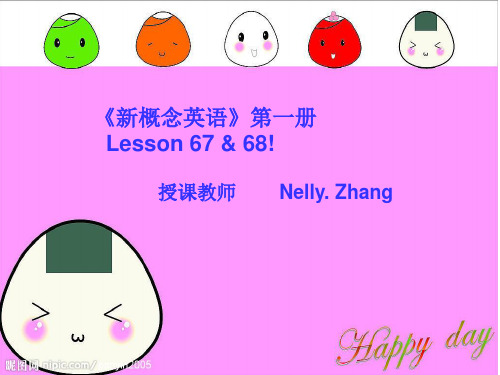
Sunday, January 1st Where was she on…? When was she at church?
at the baker’s
Friday, June 6th Where was she on…? When was she at the baker’s?
Pari work:Ask and answer!
When was Jimmy absent from shcool? He was absent from school on Monday, Tuesday,Wednesday and Thursday. How many days are the Johnsons going to say in the country? They are going to stay there for three days.
现在已经结束的动作。本课学习了带有be动词的一 般过去时。本时态常和有明确表示过去的时间连用。
1.肯定句结构:主语+was/were+...,第一, 第三人称的过去时(am/is)要变为was。 其余的都用were。 was/were 2. 一般疑问句:________提前,其余不 变。 肯定回答:Yes,主语+was/were. 否定回答:No, 主语+wasn't/weren't. not was/were 3.否定句在_________后加______,其余 不变。
Can you retell it?
Homework!
1. Retell the dialogue. 2. Finish the related exercise. 3. Learn the new words by heart.
2019精选教育新概念一册Lesson67 68(共22张PPT).ppt
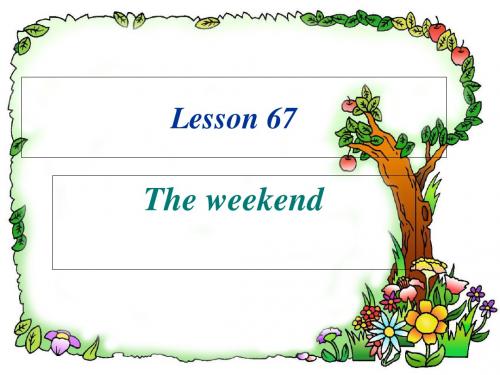
Where are the Whites going to spend the weekend?
② v. 花钱买……
spend some money + on +sth. 女人都花很多钱来买衣服。 Women spend a lot of money on clothes. 孩子们花费很多时间上网。 Children spend a lot of time on Internet.
keep the window open
2、(身体健康)处于(状况)
How are you keeping ?=How are you ?
★spend v. 度过
① 度过(一段时间) spend + n./pron. 度过
我们要在我妈妈家呆几天。
We are going to spend two days at my mother’s.
My father is always busy on weekdays .
★country n. 乡村
① n. 国家;国土;故乡
China is a big country.
② n. 乡下,乡村
country表示“农村”时,前面一定要
加定冠词the。 ★lucky adj. 幸运的
She is a lucky girl .
否定疑问句
否定疑问句表示双重肯定 表示说话者惊异的情绪、责难的口吻或赞 叹;也可表示说话者的某种建议、邀请、 请求或看法等。
Haven’t I asked you?
在蔬菜水果店 在肉店里 在牙医的诊所
at the hairdresser's at the stationer’s at my mother‘s
② v. 花钱买……
spend some money + on +sth. 女人都花很多钱来买衣服。 Women spend a lot of money on clothes. 孩子们花费很多时间上网。 Children spend a lot of time on Internet.
keep the window open
2、(身体健康)处于(状况)
How are you keeping ?=How are you ?
★spend v. 度过
① 度过(一段时间) spend + n./pron. 度过
我们要在我妈妈家呆几天。
We are going to spend two days at my mother’s.
My father is always busy on weekdays .
★country n. 乡村
① n. 国家;国土;故乡
China is a big country.
② n. 乡下,乡村
country表示“农村”时,前面一定要
加定冠词the。 ★lucky adj. 幸运的
She is a lucky girl .
否定疑问句
否定疑问句表示双重肯定 表示说话者惊异的情绪、责难的口吻或赞 叹;也可表示说话者的某种建议、邀请、 请求或看法等。
Haven’t I asked you?
在蔬菜水果店 在肉店里 在牙医的诊所
at the hairdresser's at the stationer’s at my mother‘s
新概念英语第一册第67-68课课件 Liya

Was he a farmer six years ago? 他六年前是农民吗?
④My friends
were
so sad.
我的朋友们很伤心。 teachers. 张小姐2天前病了。
Were your friends so sad? 你朋友们伤心吗?
⑤His father and his mother were 他爸爸和妈妈以前是老师。 ⑥Miss Zhang was ill 2 days ago.
He wasn’t a farmer six years ago. 他六年前不是一名农民。
④My friends
were
so sad.
我的朋友们很伤心。 teachers.
My friends weren’t so sad. 我的朋友们不伤心。
⑤His father and mother were 他爸爸和妈妈以前是老师。
His father and mother weren’t teachers. 他爸爸妈妈以前不是老师。
⑥Miss Zhang
was
ill 2 days ago.
张小姐前两天病了。
Miss Zhang wasn’t ill 2 days ago. 张小姐前两天没有生病。
一般过去时的句型构成形式:
一、含有系动词(be动词——am/is/are)的一般过去时形式: ✿疑问句: Was /Were + 主语 + …? e.g. ① I was late yesterday. 昨天我迟到了。
Were his father and mother teachers? 他爸爸妈妈以前是老师吗? Was Miss Zhang ill 2 days ago? 张小姐2天前病了吗? 肯定回答:Yes,主语 was/were. 否定回答: No, 主语 wasn’t/weren’t.
④My friends
were
so sad.
我的朋友们很伤心。 teachers. 张小姐2天前病了。
Were your friends so sad? 你朋友们伤心吗?
⑤His father and his mother were 他爸爸和妈妈以前是老师。 ⑥Miss Zhang was ill 2 days ago.
He wasn’t a farmer six years ago. 他六年前不是一名农民。
④My friends
were
so sad.
我的朋友们很伤心。 teachers.
My friends weren’t so sad. 我的朋友们不伤心。
⑤His father and mother were 他爸爸和妈妈以前是老师。
His father and mother weren’t teachers. 他爸爸妈妈以前不是老师。
⑥Miss Zhang
was
ill 2 days ago.
张小姐前两天病了。
Miss Zhang wasn’t ill 2 days ago. 张小姐前两天没有生病。
一般过去时的句型构成形式:
一、含有系动词(be动词——am/is/are)的一般过去时形式: ✿疑问句: Was /Were + 主语 + …? e.g. ① I was late yesterday. 昨天我迟到了。
Were his father and mother teachers? 他爸爸妈妈以前是老师吗? Was Miss Zhang ill 2 days ago? 张小姐2天前病了吗? 肯定回答:Yes,主语 was/were. 否定回答: No, 主语 wasn’t/weren’t.
新概念英语第一册课件Lesson67-68

joke
v. 开玩笑,戏弄,嘲弄 --My brother is always joking.我的兄弟经常开玩笑 --You must be joking.你在开玩笑吧 --I joked with him. 我和他开玩笑 --n. 玩笑
--He sometimes tells jokes. 他有时会说笑话。
not anything
not anybody
not anyone
3.一般情况下,形容词修饰名词时,通常形容词放在名词前面 a beautiful bird 形容词修饰不定代词时,通常形容词放在不定代词之后。 something good, anything wrong 回忆一下enough的用法 动词不定式可以跟在不定代词之后做定语 something to do, nothing to eat
--She is everything to me. 她是我的一切。
anything
pron. 任何东西
(用于疑问句,if从句)任何事 物 (用于否定句)任何东西都(不) --Did you say anything? 你说了些什么吗? --Has anything happened during my absence? 我不在时发生了什么事吗? --Do you want anything to drink? 你想喝点什么? --If there’s anything I can do for you, please tell me. 如果有什么我能帮你的,
1)以人或事为主语时,impossible 不能做表语与不定式连用,必须用少作形式主语。
--It is impossible for him to do it. 要他做那件事是不可能的。 --He is impossible to do it. (错误) 2)it 也可不做主语,而做宾语。 --Illness made it impossible for him to go. / Illness made him impossible to go.生病使他不能去。
新概念一L67-68ppt(推荐完整)
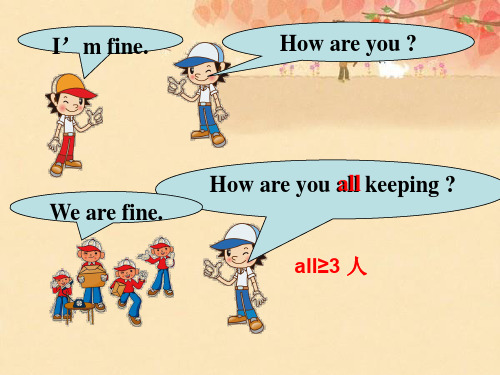
/kVntri/n. country 乡村 表示乡村时前加the in the country 在乡村 /'lVki/adj. lucky 幸运的
/tSE:tS/n. church 教堂 at church 做礼拜 /'deEri/n. dairy 乳品店at the dairy /'beIKE/n. baker 面包师傅 at the baker’s /'grEusE/n. grocer 食品杂货商
at the grocer’s
随堂补充资料
1. Monday is after S_u_n_d_a_y____. 2. The ba_k_e_r____ can make nice bread. 3. I’m going to pse_n_d_____ two days in French. 4. Jill has a temperature. She is a_b_s_e_n_t_ from
school today. 5. Thursday is between We_d__n_e_s_d_a_y and Friday.
二、Text
请欣赏音图动漫!(twice)
1. How’s Jimmy today? Key: He’s very well.
2. What are the Johnsons going to do
We are going to spend three days in the country. We are going to stay at my mother’s for the
weekend.
MRS. WILALIrAeMn’S:t Friday, Saturday and Sunday in the
- 1、下载文档前请自行甄别文档内容的完整性,平台不提供额外的编辑、内容补充、找答案等附加服务。
- 2、"仅部分预览"的文档,不可在线预览部分如存在完整性等问题,可反馈申请退款(可完整预览的文档不适用该条件!)。
- 3、如文档侵犯您的权益,请联系客服反馈,我们会尽快为您处理(人工客服工作时间:9:00-18:30)。
② She mu①stWgehte/③cnommWueestehsnohjmoeyegoaeuttr1hs0oe:ml1ve5es.?/.a quarter past ten.
主格 I he she it we they you
宾格 me him her it us them you
…的 my
his her its our their your
at the greengrocer's at the butcher's at the dentist's at the hairdresser's at the stationer’s at my mother’s
在蔬菜水果店 在肉店里 在牙医的诊所
在理发店 在文具店 在我妈妈家
greengrocer /ɡri:nɡrəusə/ greengrocer’s
lucky
幸运的
Monday Tuesday Wednesday Thursday Friday Saturday Sunday
weekend
★greengrocer n. 蔬菜水果零售商
• 在英文中,表示店铺、住宅、公共机构、 公共建筑物以及教堂的名字或某人家时, 名词所有格后常不出现它所修饰的名词:
Would you keep my things for me when I’m away?
• Keep off 避开,不接近 • eg. Keep off the grass
• Keep on 继续,保持 • eg. Keep on writing.
• Keep up with 跟上,赶上 • eg. I can’t keep up with you.
Discussion
1. What did you do on weekend? 2. What are you going to do at the
weekend?
• Review • 1.Make a sentence with must/mustn’t. • translation: • ①她什么时候必须回家? • ②她必须在10点15分之前回家。 • ③我们玩的很开心。
• Take (it 做主语,花费时间) • <It takes (took) +时间 +to do sth> • eg. It took me 2 hours to read books.
• cost 物做主语,表示物的售价 我买了一条新项链,花了我2000美元。
I bought a new necklace, it costs me 2000 dollars. • afford 人作主语,支付得起,腾出时间
★absent adj. 缺席的 • be absent from 不在,缺席
be absent from school 缺课 be absent from work 旷工 她不喜欢上学,所以她经常缺课。
She doesn’t like school, so she is often absent from school.
I can’t afford it.
I want to have a picnic with some of my friends, but they can’t afford some time for me.
I can afford one day for you.
★absent adj. 缺席的 (反)present 出席的
<at present> 现在,目前
• (n.) absence 缺席
★keep v. (身体健康)处于(状况);保 存,保留保守;储藏
翻译: 1. 让病人镇静 Keep the patient calm. 2. 他保不住自己的工作了。 He would not be able to keep his job. 3. 当我离开的时候,你能为我保管一下我 的东西吗?
butcher
/butʃə/
butcher’s
翻译: 这周五我将在我妈妈家住。
• I am going to stay at my mother's this Friday. 他们这周末要在她爷爷家住。
• They are going to stay at her grandfather's this weekend.
名词性…的 反身代词
mine
myself
his
himself
hers
herself
its
itself
ours
ourselves
theirs
themselves
yours
yourselves
New Words
greengrocer 零售商
absent
缺席的
keep
处于
spend
度过
country 乡村
★spend v. 度过 (过) spent ① v. 花(时间等);度过 • spend + n./pron. 度过
我们要在我妈妈家呆几天。
We are going to spend several days at my mother’s.
我想这周末在乡下度假。
I want to spend my holiday in the country this weekend.
② v. 用(钱),花费(人做主语)
• spend 时间/金钱 + on +sth. 女人都花很多钱来买衣服。
Women spend a lot of money on clothes. 孩子们花费很多时间上网。
Children spend a lot of time on Internet.
• spend 时间/金钱 +(in) doing sth. • 我花 2小时来读书。 • I spent 2 hours reading books. • She spent 100 yuan buying books.
1.我希望你不在看电视上浪费太多时间。
I hope that you wouldn’t spend so much time watching television. 2. 这周末White一家要在哪过?
Wheweekend?
主格 I he she it we they you
宾格 me him her it us them you
…的 my
his her its our their your
at the greengrocer's at the butcher's at the dentist's at the hairdresser's at the stationer’s at my mother’s
在蔬菜水果店 在肉店里 在牙医的诊所
在理发店 在文具店 在我妈妈家
greengrocer /ɡri:nɡrəusə/ greengrocer’s
lucky
幸运的
Monday Tuesday Wednesday Thursday Friday Saturday Sunday
weekend
★greengrocer n. 蔬菜水果零售商
• 在英文中,表示店铺、住宅、公共机构、 公共建筑物以及教堂的名字或某人家时, 名词所有格后常不出现它所修饰的名词:
Would you keep my things for me when I’m away?
• Keep off 避开,不接近 • eg. Keep off the grass
• Keep on 继续,保持 • eg. Keep on writing.
• Keep up with 跟上,赶上 • eg. I can’t keep up with you.
Discussion
1. What did you do on weekend? 2. What are you going to do at the
weekend?
• Review • 1.Make a sentence with must/mustn’t. • translation: • ①她什么时候必须回家? • ②她必须在10点15分之前回家。 • ③我们玩的很开心。
• Take (it 做主语,花费时间) • <It takes (took) +时间 +to do sth> • eg. It took me 2 hours to read books.
• cost 物做主语,表示物的售价 我买了一条新项链,花了我2000美元。
I bought a new necklace, it costs me 2000 dollars. • afford 人作主语,支付得起,腾出时间
★absent adj. 缺席的 • be absent from 不在,缺席
be absent from school 缺课 be absent from work 旷工 她不喜欢上学,所以她经常缺课。
She doesn’t like school, so she is often absent from school.
I can’t afford it.
I want to have a picnic with some of my friends, but they can’t afford some time for me.
I can afford one day for you.
★absent adj. 缺席的 (反)present 出席的
<at present> 现在,目前
• (n.) absence 缺席
★keep v. (身体健康)处于(状况);保 存,保留保守;储藏
翻译: 1. 让病人镇静 Keep the patient calm. 2. 他保不住自己的工作了。 He would not be able to keep his job. 3. 当我离开的时候,你能为我保管一下我 的东西吗?
butcher
/butʃə/
butcher’s
翻译: 这周五我将在我妈妈家住。
• I am going to stay at my mother's this Friday. 他们这周末要在她爷爷家住。
• They are going to stay at her grandfather's this weekend.
名词性…的 反身代词
mine
myself
his
himself
hers
herself
its
itself
ours
ourselves
theirs
themselves
yours
yourselves
New Words
greengrocer 零售商
absent
缺席的
keep
处于
spend
度过
country 乡村
★spend v. 度过 (过) spent ① v. 花(时间等);度过 • spend + n./pron. 度过
我们要在我妈妈家呆几天。
We are going to spend several days at my mother’s.
我想这周末在乡下度假。
I want to spend my holiday in the country this weekend.
② v. 用(钱),花费(人做主语)
• spend 时间/金钱 + on +sth. 女人都花很多钱来买衣服。
Women spend a lot of money on clothes. 孩子们花费很多时间上网。
Children spend a lot of time on Internet.
• spend 时间/金钱 +(in) doing sth. • 我花 2小时来读书。 • I spent 2 hours reading books. • She spent 100 yuan buying books.
1.我希望你不在看电视上浪费太多时间。
I hope that you wouldn’t spend so much time watching television. 2. 这周末White一家要在哪过?
Wheweekend?
